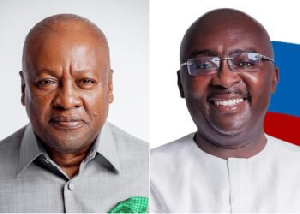
The incumbent New Patriotic Party (NPP) and opposition National Democratic Congress (NDC) fought a tough battle in the 2024 Ghanaian presidential election, revealing a changing political landscape. According to the findings, both parties had notable regional gains and losses in comparison to the 2020 elections. The NDC achieved modest overall gains with notable advances in certain areas, while the NPP saw significant declines in its traditional strongholds and battleground regions.
Historical Background of Election Trends in Ghana
The NDC and the NPP have been the two main political parties in Ghana since the Fourth Republic was established in 1992. In the Ashanti and Eastern Regions, which are frequently referred to as its "political backbone," the NPP has always done well, whilst the NDC is steadfast in the Volta Region and portions of the Northern belt. Central, Western, and Greater Accra are swing areas that frequently determine election results.
In the 2020 elections, Nana Akufo-Addo of the NPP won thanks to a good performance in both traditional and urban stronghold areas. The NDC, under by former President John Dramani Mahama, strengthened its base and made significant progress in key areas, whereas the NPP witnessed a dramatic drop in the 2024 election under Mahamudu Bawumia's leadership.
NPP's Refusals: A Significant Change in Support
The NPP suffered severe losses in all regions, but especially in its swing and core areas:
Greater Accra Area
Greater Accra saw the NPP suffer its biggest defeat, with a startling 46% decline in votes. Compared to Nana Akufo-Addo, who received 1,253,179 votes in 2020, Mahamudu Bawumia received 681,535 votes. Greater Accra, which has a diversified and urbanized electorate, has historically been a swing region, but in 2024 it began to shift more and more toward the NDC.
Area Central
Central, a conventional swing area, caused the NPP to drop 38%. From 613,804 votes in 2020 to 382,749. Because the NDC took advantage of voter dissatisfaction and historical ties to the area, this result shows a decline in trust in the incumbent party.
The Ashanti Province
Votes for the NPP fell from 1,795,824 in 2020 to 1,366,800, a 24% decrease even in its stronghold in the Ashanti Region. Voter indifference and possible discontent among the party's core supporters are indicated by this decline. Although the NPP continued to rule the area, the sharp decline raises questions about its future electoral tactics.
Support for the NPP has been eroding nationally, as seen by other noteworthy drops in the Volta Region (-44%), Western Region (-37%), and Eastern Region (34%).
NDC's Gains: A Consistent Resurrection
The NDC benefited from the NPP's defeats, especially in areas where election turnout and support rose:
Northern Area
The Northern Region saw Mahama's vote grow by 11%, from 476,550 in 2020 to 529,456 in 2024, marking the NDC's largest gain. This reinforces the Northern Region as a vital NDC stronghold, supported by the party's focused campaigning and Mahama's heritage.
The Ahafo Region
In the Ahafo Region, which is smaller but still competitive, the NDC gained 12% more votes, from 116,485 to 130,106. This increase demonstrates the NDC's capacity to gain ground in areas where the NPP once had a sizable advantage.
The Region of Bono
Between 2020 and 2024, the Bono Region saw a significant 16% increase in the number of votes cast, from 203,392 to 235,681. This result highlights the NDC's approach to winning back support in swing areas.
Further increases were noted in the Upper West (+2%) and Western North (+3%), indicating slight advancements in all important areas.
NDC's Disadvantage: Savannah Area
In spite of its overall successes, the NDC saw a significant defeat in the Savannah Region, where Mahama's vote count fell from 144,244 to 134,563, a 7% decrease. Being Mahama's home region, this outcome can be a reflection of discontent with the campaign or local performance of the NDC.
Countrywide Overview: A Story of Differing Fortunes
Between 2020 and 2024, the NPP's overall number of votes fell by 30.8%, from 6,730,587 to 4,657,304. In contrast, the NDC had a little 1.9% national rise, increasing from 6,213,182 to 6,328,397 votes.
Voters are generally not happy with the NPP, especially in swing and urban areas, according to the trends. Even though the NDC saw some success, its expansion was narrow and focused, underscoring the necessity for both parties to review their approaches before the next election.
Crucial Lessons
The NPP's biggest losses were in the Greater Accra (46%) and Volta (44%) and Central (38%) regions.
Gains for the NDC The Northern (+11%), Ahafo (+12%), and Bono (+16%) Regions had the biggest gains for the party.
Despite its overall successes, the NDC's 7% Savannah drop stands out as a significant obstacle.
Final Thoughts
Ghana's regional political landscape has changed as a result of the 2024 elections, with the NDC making modest gains and the NPP suffering from historically steep losses in strategic areas. As both parties consider the results, it is evident that regional dynamics, urbanization, and voter priorities will continue to shape Ghana's political future. In order to be competitive in the next years, the results highlight the increasing necessity for both parties to actively engage with voters in both swing and traditional stronghold areas.